
Eriophyllum lanatum, with the common names common woolly sunflower, Oregon sunshine and golden yarrow, is a common, widespread, North American plant in the family Asteraceae.

Ericameria nauseosa, commonly known as chamisa, rubber rabbitbrush, and gray rabbitbrush, is a shrub in the sunflower family (Aster) found in the arid regions of western North America.
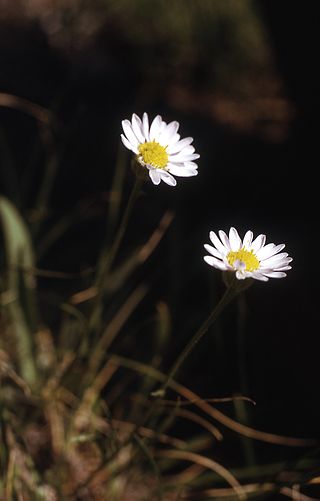
Erigeron eatonii is a North American species of flowering plants in the family Asteraceae known by the common name Eaton's fleabane.

Leslie Gulch is a canyon in Malheur County, Oregon, United States. It is on the east side of Owyhee Lake, a reservoir on the Owyhee River. Its abundant and striking rock formations are made of tuff.

Galium grayanum is a species of flowering plant in the coffee family known by the common name Gray's bedstraw. It is native to the high mountains of northern California, western Nevada and southwestern Oregon.
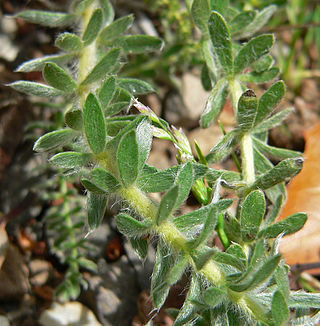
Ivesia is a genus of flowering plants in the rose family known generally as mousetails. They are perennial herbs native to western North America, especially the western United States. Plants of this genus are sometimes treated as members of genus Potentilla.
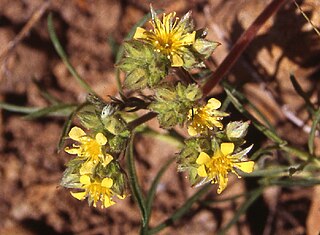
Ivesia aperta is a species of flowering plant in the rose family known by the common name Sierra Valley mousetail.

Ivesia lycopodioides is a species of flowering plant in the rose family known by the common name clubmoss mousetail, or clubmoss ivesia. It is native to the Sierra Nevada and to regions east of the range in California. It may also be found beyond the state line into Nevada. This is a perennial herb which grows in the crevices of rock ledges in the mountains and in wet high-elevation meadows. It produces a rosette of flat to cylindrical leaves up to 15 centimeters long, each of which is made up of many tiny, lobed leaflets. The stems may grow erect or drooping to 30 centimeters long and each holds an inflorescence of clustered flowers. Each flower has hairy, greenish triangular sepals and much larger oval-shaped petals of bright yellow. In the center of the flower are usually five stamens and several pistils. There are three subspecies.

Lepidium montanum is a species of flowering plant in the mustard family known by the common names mountain pepperweed, mountain peppergrass, mountain pepperwort, and mountain pepperplant. It is native to western North America from Oregon to Montana to northern Mexico, where it can be found in a number of habitats, often on salty or gravelly soils. There are several varieties, many of which are difficult to distinguish.

Astragalus purshii is a species of milkvetch known by the common names woollypod milkvetch and Pursh's milkvetch.

Erigeron petrophilus is a species of flowering plant in the family Asteraceae known by the common names rockloving erigeron or cliff fleabane. It is native to the mountain ranges of California from Siskiyou County south as far as San Luis Obispo County and El Dorado County. It also grows in southwestern Oregon.
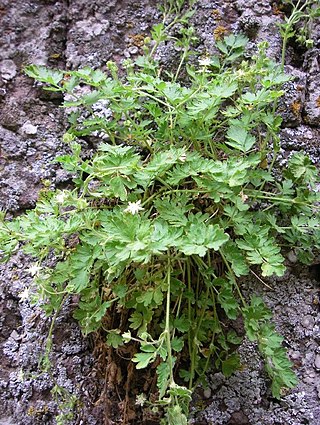
Ivesia baileyi is a species of flowering plant in the rose family known by the common name Bailey's ivesia.
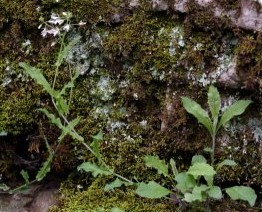
Borodinia perstellata, commonly known as Braun's rockcress and Nevada rockcress, is a rare species of flowering plant in the mustard family. It is native to Kentucky and Tennessee, where it is known from perhaps 25 total populations. Most of the occurrences have few individuals, and all are deteriorating in quality. The plant grows in shady forest habitat on limestone substrates, usually near streams or rivers. This is a federally listed endangered species of the United States.

Eriogonum argophyllum is a species of wild buckwheat known by the common names Sulphur Hot Springs buckwheat, Silver Lake buckwheat, and Ruby Valley buckwheat. It is endemic to Nevada in the United States, where there is only one known population.
Eriogonum crosbyae is a species of wild buckwheat known by the common name Crosby's buckwheat. It is native to southcentral Oregon and northwestern Nevada in the United States. Some treatments include plants in Montana and Idaho as members of this species. This plant was first discovered in the Guano Valley in Lake County, Oregon, in 1978 by Bureau of Land Management botanist Virginia Crosby, and it was named for her in 1981.
Frasera gypsicola is a species of flowering plant in the gentian family known by the common names Sunnyside green-gentian, Sunnyside elkweed, and Sunnyside frasera. It is native to southeastern Nevada and southwestern Utah in the United States.

Mentzelia mollis is a species of flowering plant in the Loasaceae known by the common names soft blazingstar, smooth blazingstar, and smooth stickleaf. It is native to the western United States, where it occurs in Idaho, Oregon, and Nevada.
Mentzelia packardiae is a species of flowering plant in the Loasaceae known by the common names Packard's blazingstar and Packard's stickleaf. It is native to the western United States, where it is known from a small area in Oregon and Nevada.
Trifolium leibergii is a species of flowering plant in the legume family known by the common name Leiberg's clover. It is native to Oregon and Nevada in the United States.

The flora of the U.S. Sierra Nevada alpine zone is characterized by small, low growing, cushion and mat forming plants that can survive the harsh conditions in the high-altitude alpine zone above the timber line. These flora often occur in alpine fell-fields. The Sierra Nevada alpine zone lacks a dominant plant species that characterizes it, so may or may not be called a vegetation type. But it is found above the subalpine forest, which is the highest in a succession of recognized vegetation types at increasing elevations.

















